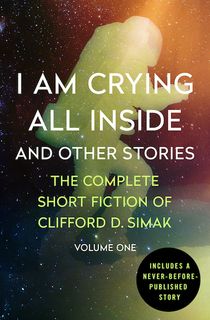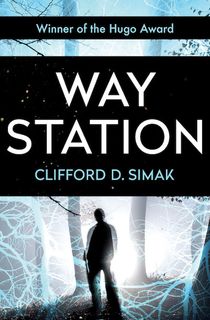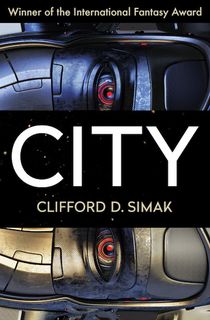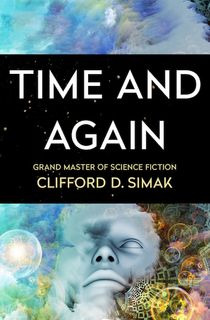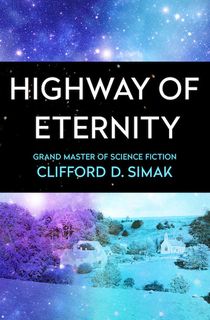Clifford D. Simak was born in Millville, Wisconsin on August 3rd, 113 years ago today. The late sci-fi, fantasy, and Western author was a lifelong proponent of the power of science fiction, and made an indelible impact on the genre.
When he passed away in 1983 at the age of 88, Simak was a multiple Hugo and Nebula Award-winner and had been named a Grand Master by the Science Fiction and Fantasy Writers of America (SFWA). He left behind a remarkable body of work that cautions humanity about our reliance on weapons and technology, but is ultimately optimistic about the nature of our species. In honor of his birthday, let’s take a look back at some of Simak’s words of wisdom, many of which are even more relevant today than when they were written.
“I like losers.”
In the Simak anthology I Am Crying All Inside and Other Stories, editor David W. Wixon writes in a foreword that the titular story "was originally published in the August 1969 issue of Galaxy Science Fiction, and I’ve never been able to get it out of my head. It reminds me that at one time, when Cliff was told that his heroes were “losers,” his reply was 'I like losers.'"
It's hard not to sympathize with Sam, the 'loser' protagonist in I Am Crying All Inside. Sam is a descendant of ''the misfits, the loafers, the poor, the crippled, the stupid” left behind on Earth when the privileged classes traveled to the stars. After being burdened with the knowledge of who his ancestors were, Sam may never be truly content again.
RELATED: 10 Octavia Butler Quotes to Live By
"Somewhere, he thought, on the long backtrack of history, the human race had accepted an insanity for a principle and had persisted in it until today that insanity-turned-principle stood ready to wipe out, if not the race itself, at least all of those things, both material and immaterial, that had been fashioned as symbols of humanity through many hard-won centuries."
This unnervingly timely quote comes from Simak’s Hugo Award-winning book Way Station, which chronicles the life of Enoch, a former Civil War soldier tasked with maintaining a way station between the galaxies for centuries. Enoch’s unique position as intergalactic innkeeper gives him a vantage point on the universe as a whole, and the role humanity plays in it. Set in the 1960s, Way Station often explores Enoch's concerns about warfare and nuclear weapons.
RELATED: Enter to Win Passes for the Museum of Science Fiction's "Escape Velocity!"
"That was the way with Man; it had always been that way. He had carried terror with him. And the thing he was afraid of had always been himself."
Another quote from Way Station, this passage alludes to humanity's ignorance of its own nature, a recurring theme in Simak's writing.

“Man was engaged in a mad scramble for power and knowledge, but nowhere is there any hint of what he meant to do with it once he had attained it. "
This quote comes from Simak’s International Fantasy Award-winning novel City, a series of short stories, told partially from the point of view of dogs, about the collapse of the race known as Man. During long nights “when the fires burn high and the winds are from the north” the dogs, all avowed pacifists, recount the stories of Man to each other.
"Man's inability to understand and appreciate the thought and viewpoint of another man would be a stumbling block which no amount of mechanical ability could overcome.”
In City, the book's canine narrator concludes that, based on the legends, Man's "preoccupation with a mechanical civilization rather than with a culture based on some of the sounder, more worthwhile concepts of life indicates a lack of basic character." The quote above illustrates the dogs' dismay and confusion over humanity's aimless grasping. To their eyes, “Man was running a race, if not with himself, then with some imagined follower who pressed close upon his heels, breathing on his back.”

"Before Man goes to the stars he should learn how to live on Earth."
In Simak's ambitious novel Time and Again, Asher Sutton miraculously appears on Earth after disappearing in a distant star system decades ago. He returns in a ruined ship with an urgent message for humans, but his newfound knowledge puts him in the path of time traveling assassins determined to prevent Sutton from changing the past, present, and future.
The above quote comes from a conversation between Asher and a relative from the past about contentment, and how humanity's dissatisfaction and short-sightedness may send them to the stars too soon.
"Much of what we see in the universe [...] starts out as imaginary. Often you must imagine something before you can come to terms with it."
This quote comes from Simak's final novel, Highway of Eternity. A mind-bending time travel tale, Highway of Eternity follows two secret agents whose investigation into a disappearance leads them to the Immortals, a race of aliens promising eternal life to humans willing to sacrifice their earthly form. The result is a novel that challenges how readers perceive the universe, time, and their own mortality.
"It is we, tired and jaded from having read so much, that have lost our sense of wonder."
This quote comes from a speech Simak gave as a guest of honor at the Noreascon Banquet in Boston, Massachusetts during the 1971 Worldcon. Speaking to a room full of established genre writers like Robert Silverberg, Forrest J. Ackerman, and Gordon Dickson, Simak addressed his own evolution from young, wide-eyed science fiction fan to established member of the science fiction community. He argued that long-time sci-fi writers who have become frustrated with the genre should consider their disillusionment may be the result of their own jadedness, rather than any decline in the quality of science fiction. Newcomers to sci-fi could, in his opinion, still find just as much to wonder at.
Simak also addressed the 'New Wave' sci-fi movement that manifested in the 60s and 70s. Characterized by more of a literary, political focus and less of an adherence to hard science than the 'Golden Age' of science fiction that Simak came up in, the New Wave initially caused some consternation among the sci-fi establishment. But, according to Simak, he ultimately embraced the New Wave shift: the greater the breadth of voices in science fiction, the greater the possibility of continuing to create a sense of wonder in new readers.
You can listen to Simak's speech in its entirety below, beginning at the 28 minute mark.

